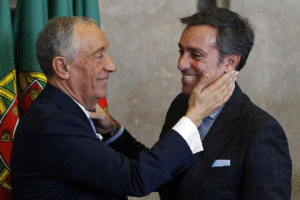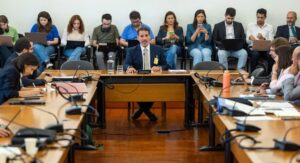PM dubs it “first positive sign”, albeit far from desirable
Portugal’s ‘response’ to the limited truce for Ukraine – emerging from the telephone conversation between President Donald Trump of the United States, and his Russian counterpart – has been interesting: President Marcelo is adamant that it is “not even the first step towards a resolution of the conflict”, while outgoing prime minister Luís Montenegro has tried to inject positivity, calling it the first positive sign, although “not desirable”.
The fact that Russian missiles bombed a Ukrainian energy infrastructure hours after the so-called truce on such attacks was agreed arguably made the situation even less desirable.
But what was curious was the different interpretations of what emerged from the much-anticipated telephone call between President Trump and President Putin.
On the last leg of his official visit to Slovenia, Portugal’s president told journalists that “there has been a unanimous response of disappointment (…) What Portugal has been arguing for is that the welcome ceasefire shouldn’t be an illusion, it should be an opportunity to build a dignified, just, lasting peace. We learnt yesterday that this is not yet the case. It is not a first step towards resolving the problem and creating the conditions for a just, dignified and lasting peace. To that extent, it is not good news,” he said.
Nevertheless, Marcelo accepts that the US must remain committed to this process: “In the same way that Portugal has argued that Europe must be involved and that Ukraine must be involved, it is clear that the US must be involved (…) for the US to suddenly withdraw from peace-building would be a huge weakening of a peace that we want to last, (…) They are the power that they are, they have been involved as they have, they have really played an important part (…) it is fundamental that they maintain this important role, not least because they are important in the dialogue with the European Union and they are important in NATO,” he said.
Marcelo ended his Slovenian trip today in the coastal town of Piran, where, together with Slovenia’s President Nataša Pirc Musar, he took part in a conversation with university students from the Euro-Mediterranean University (EMUNI), during which he was extremely critical of the policies pursued by the current US administration.
Lamenting on several occasions what he called the “new international disorder” – which he said began in 2016 (the start of Donald Trump’s first term) but has worsened now – Marcelo recalled that the United States can no longer be counted on to combat climate change, and criticised its radicalism” in terms of migration.
Nothing like as much criticism came from the outgoing prime minister.
Speaking at the opening of the preparatory debate today for the European Council, in the last parliamentary session of the current legislature, he said: “We all know that we are at a critical time, at a time when a partial ceasefire has been announced for energy infrastructures and, although this is not a desirable situation, it is still a first positive sign.”
Montenegro suggested this was the moment to “wait and see” how things evolve; it is too early “to draw any major conclusions”, he said. Words that somehow didn’t gel with the scenario painted of a “critical time”. ND
Source material: LUSA




















